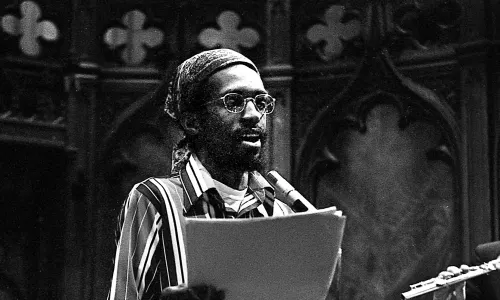Rachel Trousdale Wins Inaugural Cardinal Poetry Prize for Debut Collection
On March 25, 2025, Wesleyan University Press (WesPress) published Rachel Trousdale’s “Five-Paragraph Essay on the Body-Mind Problem,” the inaugural winner of its Cardinal Poetry Prize. The collection was selected by guest judge and former U.S. Poet Laureate Robert Pinsky from among 15 finalists. The initial screening process was led by poet John Murillo, formerly an Associate Professor of English at Wesleyan, Director and Editor-in-Chief of WesPress Suzanna Tamminen, and Kim-Frank Fellow and Assistant Editor at WesPress Oliver Egger ’23. WesPress, the Shapiro Center for Creative Writing and Criticism, and the English Department hosted a reception and champagne toast to celebrate Trousdale on Thursday, February 20.
“Since I chose this book, in the recent years, months and weeks, I’ve become increasingly proud that I had anything to do with bringing this book of poems out,” Pinsky said at the event. “Rachel Trousdale’s work, for me, is part of a long American tradition of resisting, recognizing, and disputing our old American tradition of anti-intellectualism.”
The Cardinal Poetry Prize, first conceived by Murillo several years ago, was open to poets aged 40 or older who have never published a poetry book or had not published a new original poetry collection within the last 10 years. Over the course of several months, WesPress received 428 submissions. As the Prize’s inaugural winner, Trousdale—a professor of English at Framingham State University—received a $1,000 cash prize and publication in WesPress’ Spring Poetry series.
“In our classrooms, we try to encourage our students to put the work first,” Murillo said. “Very often that requires waiting, but it’s hard to tell young poets to wait when everything around them is telling them to publish now, to publish a lot, to publish often. And so, what we wanted to do was to reward the patient writer, to reward the poet who takes the time that it takes to write a good and not a great poem. A poem can take months, years to get right, and if that’s what the poem needs, you wait.”
Trousdale—whose poems have appeared in The Nation, The Yale Review, and other journals—first published her chapbook, “Antiphonal Fugue for Marx Brothers, Elephant, and Slide Trombone,” with Fishing Line Press in 2015. While her scholarly work includes “Humor, Empathy, and Community in Twentieth-Century American Poetry” (Oxford University Press, 2021) and “Nabokov, Rushdie, and the Transnational Imagination” (Macmillan, 2010), “Five-Paragraph Essay on the Body-Mind Problem” is her first full-length collection of poetry.
Blending free verse with her own invented poetic forms, Trousdale traces the threads of connection between partners, family, and the natural world. In this playful yet piercing collection, she reveals how grief, illness, and the wonder of living a human life reshape our sense of responsibility to each other and the planet. Above all, “Five-Paragraph Essay on the Body-Mind Problem” asks what it means to love.
“Rae Armantrout, Yusef Komunyakaa, Evie Shockley, Brenda Hillman—it’s amazing to find my work in their company,” Trousdale wrote in an email to The Argus. “And the people at the press have been a delight to work with—the editors, the copy editors, the publicity team, everyone has been so kind and good at what they do.”
Trousdale grew up with a close connection to the Wesleyan community: her father, Emeritus Associate Professor William Trousdale, taught in the physics department, and her mother, Emerita Professor of Russian Language and Literature Priscilla Meyer, recently retired from the Russian, East European & Eurasian Studies department.
“I grew up running in and out of the Science Tower [now Exley Science Center] and the Russian Department’s old offices on High Street, I learned to skate in the rink, and I attended my first poetry readings on campus,” Trousdale wrote. “I’ve always loved Wesleyan’s spirit, the students’ creativity, excitement, and originality. Since I wasn’t actually in the classroom, I think a lot of my impressions of Wesleyan have been of students having their best times: undergraduate productions of Shakespeare plays, art exhibits, activism, sledding on Foss Hill. It was glorious, as a kid, having access to this adventurous near-adult world of experimentation and curiosity.”
Trousdale first began putting the manuscript together around ten years ago, but the collection contains poems dating around 15 years old. The COVID-19 pandemic, in particular, gave Trousdale both the time and the material to examine the relationship between mind and body, as well as the relationship between that which directly surrounds us and the greater natural world.
“Once I picked the title poem, the structure became quite clear to me,” Trousdale wrote. “I knew I wanted to start the book with—not a thesis statement, since it isn’t really an essay, but a kind of statement of purpose in the short opening section, and then I wanted to use the three ‘body paragraphs’ to open out the main ideas I was playing with.”
The first section primarily features love poems dedicated to the Trousdale’s spouse, while the second expands to include poems about their two children. The third section explores more unconventional themes—strange animals, fairy tales, and artistic fascinations—highlighting different forms of love and connection beyond romantic relationships. Trousdale acknowledges that the boundaries between these sections aren’t rigid, but this structure helped identify gaps in her collection, such as weaker poems that needed revision or ideas in the final section that required earlier groundwork.
“Someone recently asked me whether I think of myself as a teacher or as a poet, and I discovered I don’t know how to separate the two,” Trousdale wrote. “Both of them are about attention to detail, pattern-finding, and developing ways to connect personal interests and circumstances to much larger and sometimes quite impersonal ideas.”
As both a poet and professor, Trousdale finds that teaching and writing poetry demand the same sharp eye for detail—and a willingness to break free from rigid forms.
“Obviously ‘Five-Paragraph Essay’ as a title comes right out of teaching, since I read a lot of five-paragraph essays in first-year writing, and I’m always trying to talk students into trying new, less prescriptive structures,” Trousdale wrote. “But more generally, my students have taught me a lot about curiosity and precision, both of which are essential to writing poetry.”
Trousdale’s collection is available from Wesleyan Press, RJ Julia Booksellers, and a number of major retailers. In his back cover endorsement, Pinsky captures the incredible clarity and precision with which she writes.
“A rare gift in art is directness: to turn a clear, unsentimental gaze on love and grief in all their variations, with no smokey or mysterioso evasions,” Pinsky wrote. “Almost as valuable is meaningful surprise, the stunned laughter of recognition even if the subject for marvel is loss. The heartfelt, unpredictable poems of Rachel Trousdale attain that kind of discovery.”
Rose Chen can be reached at rchen@wesleyan.edu.







Leave a Reply